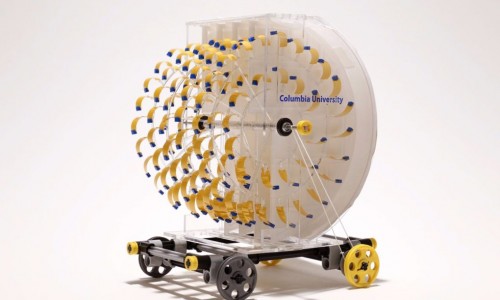RECOMMENDED VIDEOS

Energy Storage Solution "CrystEna" - Hitachi
Hitachi Asia Ltd

Green Energy Technologies Wind Sphere
Green Energy Technologies

Neutralog Solar Monitoring System
Neutrinos

SunEdison Outdoor Microstation
SunEdison

ECO USBCell Battery
Pilot Electronics
Related Stories
The largest solar farm apiary in the US opens this week
The City of London will be powered with 100% renewable energy by October 2018
New study suggests that plastic waste may be transformed into usable energy
Uravu’s zero-electricity Aqua Panels produce gallons of water from thin air
104% of Portugal’s electricity consumption in March came from renewable energy
12 Nov, 2017

Evaporation could generate 2.85 million megawatt hours of electricity each year
Renewable Energy & Energy Efficiency | UNITED STATES | 20 Oct, 2017
Published by : Eco Media Asia
In a world where much energy is wasted, valuable renewable sources may be disappearing into thin air. Scientists at Columbia University and elsewhere are working on harnessing electricity from the evaporation of water. According to Ozgur Sahin of Columbia University, water evaporating from the United States (excluding the Great Lakes) could provide up to 2.85 million megawatt hours of electricity per year – enough energy to meet two-thirds of US electricity usage in 2015. Much as solar power potential differs from state-to-state, the energy that can be harvested from evaporating water would exceed demand in 15 of the 47 states studied by researchers at Columbia.

While the potential energy from evaporation is enormous, capturing this power remains an elusive challenge. Many potential designs for evaporation energy involve engines covering the surface of freshwater bodies, irrigated fields, greenhouses, or sheltered bays. The prototypes built by Sahin’s team at Columbia are all constructed of materials that shrink as they dry, including tape covered with bacterial spores. “They work like a muscle,” said Sahin. “They can push and pull with a lot of force.” The prototypes also take advantage of changes in humidity to achieve desired results. One prototype includes shutters on top, which close and shut based on the humidity within the engine. This system enables energy generation to occur even at night, when evaporation is naturally lower due to cooler temperatures.

Renewable energy from evaporating water is still in the early stages of development and some scientists doubt that it can be cost effective. Evaporation energy would also have to contend with solar energy, which is much more advanced and increasingly affordable. However, Sahin suggests that evaporation energy engines could be constructed out of biological materials, which could be cheaper and more biodegradable than solar panels. Another factor to consider is the impact that a widespread application of evaporation engines might have; scientists at Columbia estimate that there would only be significant reduction of evaporation if an area of 250,000 square kilometers is covered by such engines. As some consider geoengineering as a potential response to climate change, evaporation energy engines may have some appeal.
Article from inhabitat.com
by Greg Beach
